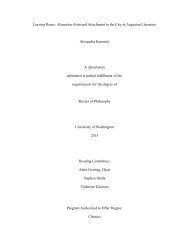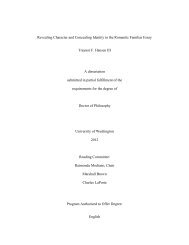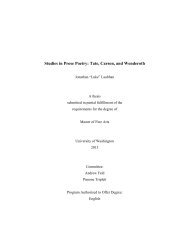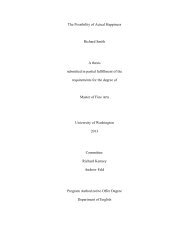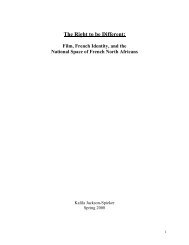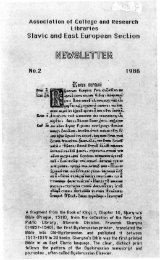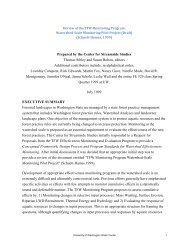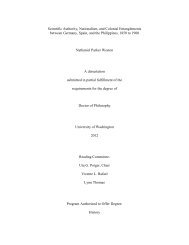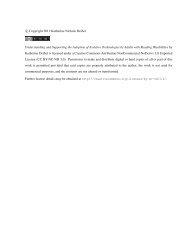Copyright 2012 Aileen M. Echiverri-Cohen - University of Washington
Copyright 2012 Aileen M. Echiverri-Cohen - University of Washington
Copyright 2012 Aileen M. Echiverri-Cohen - University of Washington
Create successful ePaper yourself
Turn your PDF publications into a flip-book with our unique Google optimized e-Paper software.
not report normal or corrected-to-normal visual acuity. No participants were excluded for either<br />
visual or auditory problems. See Table 1 for characteristics <strong>of</strong> the sample.<br />
Design<br />
The study consisted <strong>of</strong> individuals with chronic PTSD from pre-to post-treatment,<br />
comparing modality (PE vs SER) and treatment response (change in interviewer-rated PTSD<br />
severity from pre- to post-treatment). The dependent variables were percent accuracy for<br />
attentional blink and percent inhibition <strong>of</strong> startle for PPI.<br />
Measures<br />
Structured Clinical Interviews. A trained independent evaluator (IE), who was blind to<br />
treatment condition, administered the diagnostic interviews and self-report measures. To ensure<br />
inter-rater reliability, IEs were trained to a reliable standard <strong>of</strong> 80% agreement on the<br />
Posttraumatic Symptom Scale-Interview (PSSI-I) and Structured Clinical Interview for the<br />
DSM-IV (SCID-IV) by joint discussions before beginning assessments. Cross-site training and<br />
reliability rating <strong>of</strong> 10% <strong>of</strong> the interviews were conducted to minimize rater drift and ascertain<br />
reliability.<br />
Posttraumatic Symptom Scale-Interview Version (PSS-I; Foa, Riggs, Dancu, &<br />
Rothbaum, 1993) is a semi-structured interview that assesses DSM-IV PTSD diagnosis. It yields<br />
total symptom severity and symptom cluster severity. It shows good inter-rater reliability (r =<br />
.93-.95) and convergent validity with other PTSD measures (Foa, Friedman, & Keane, 2000).<br />
Inter-rater reliability was assessed by randomly re-coding 10% <strong>of</strong> the PSS-I audiotape<br />
recordings. In the present study, reliability coding <strong>of</strong> 10% <strong>of</strong> the cases yielded good reliability<br />
(ICC = .83).<br />
19



